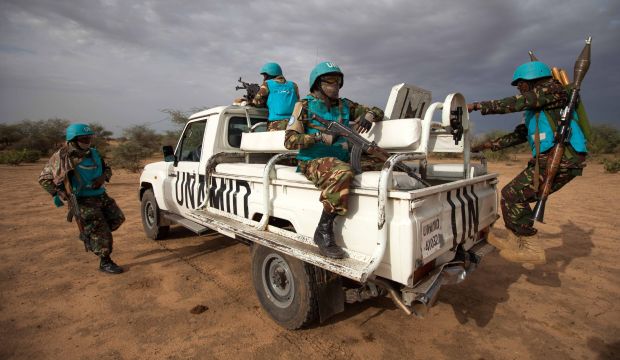
UNAMID troops from Tanzania, deployed in Khor Abeche, South Darfur, conducting a routine patrol in Karbab village, where the community reported threats by other tribes, Sudan, 01 July 2014. (EPA/ALBERT GONZALEZ FARRAN / UNAMID / HANDOUT)
The spokesman for the Justice and Equality Movement (JEM), Jibril Bilal, said the latest report from the head of the African Union–United Nations Mission in Darfur (UNAMID) “lacked credibility” because it did not discuss government air strikes and the activities of the Rapid Support Forces (RSF)—pro-government militias tasked with fighting rebels.
Bilal added that recent comments by the UN and AU joint envoy, Mohamed Ibn Chambas, that fighting between the main parties had ended, did not take account of the actions of government-affiliated militias east of Jabal Murrah and other areas of Darfur.
Bilal said: “Major battles took place recently between government forces, supported by their militias, against rebels, and the martyrdom of Commander Ali Karbino serves as an example of the lack of credibility of the UNAMID report.”
He added: “Ibn Chambas tried to absolve the ruling National Congress Party of any responsibility for the crimes committed daily in Darfur.” He said Ibn Chambas accused the militias of committing “heinous crimes,” when it fact it was the RSF who were responsible.
“We call on the international community to hold UNAMID responsible for the protection of the civilians in Darfur, and if it fails, the [UN] Security Council must review the work of the mission and appoint others or increase the number of troops on the ground,” the JEM spokesman said.
UNAMID was criticized in a number of media reports earlier this year, after a former member of the mission said it had failed to protect civilians in Darfur from attacks by government forces.
Aicha Elbasri, the former spokeswoman for the mission, told Foreign Policy magazine in April that UNAMID had been unable from the start of its mandate to protect civilians, and that it had tried to cover up its shortcomings.
In a briefing to the AU’s Peace and Security Council last week, Ibn Chambas said the spread of militias, crime and banditry in Darfur was a source of concern, despite the cessation of fighting between the main warring parties in recent weeks.
He added that there was still much that could be achieved by disarming militias in order to achieve peace in Darfur, and that violence continued between local communities and tribes, who competed for the region’s resources.
Ibn Chambas said the deterioration in security and the actions of the government forces, militias and armed movements posed challenges to the delivery of humanitarian aid and the protection of civilians.
He also called on the AU Peace and Security Council to recommend to the UN Security Council the extension of UNAMID’s mission for one more year, and that he was working with the AU and other parties to coordinate mediation efforts in the region.
The force, established in 2007, has 20,000 troops drawn from several African, Asian and Middle Eastern states. Over 170 members have been killed over the last seven years.
Meanwhile, Sudanese President Omar Al-Bashir defended the RSF. He said they were credited with ending the rebellion in the former Sudanese province of Kordofan, and condemned political parties who criticized them.
Bashir said: “The crime of the Rapid Support Forces in the eyes of these parties is that they ended the rebellion.”
